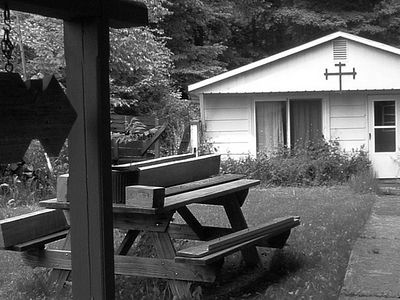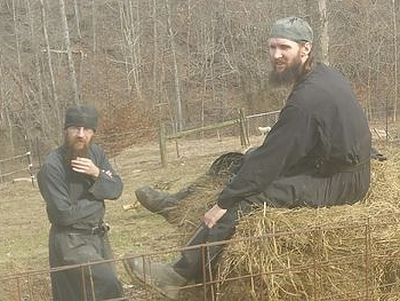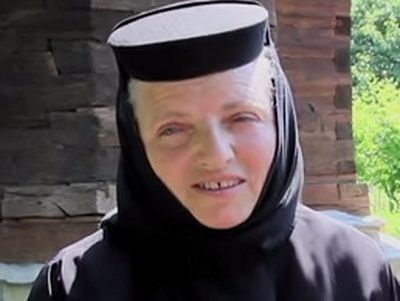Source: Lansing State Journal
The chanting of sacred songs fills a home, interrupted occasionally by the creak of wooden floors or the trill of wind chimes on the front porch.
The smell of incense in the small chapel mixes with an aroma of fresh-baked baguettes in the kitchen.
Gleaming wood floors and railings hint at the Putnam Street home’s century of life — a timeworn shell for the newfound monastery within.
Things move at a slow pace for St. Romanos American Monastery and the black-robed man who calls it home.
Though the monastery hasn’t been formally recognized yet by the Orthodox Church, Roman has been living a monastic life there for about a year and a half.
“It’s a humble beginning,” he said.
The 48-year-old retired Air Force lieutenant colonel — whose specialty in space operations included work on five space shuttle missions — traded in his military uniform for the dark garb of an Orthodox monk about three years ago. He initially joined a monastery in Detroit before starting the Williamston location in 2015.
“I’d considered it at different points in my life,” Roman said. “...The life that I desired just happened to coincide with the monastic life.”
Roman leads a quiet, celibate life and devotes his day to prayer and work. While it’s just Roman at the monastery currently, he’s hoping a few other men drawn to the monastic life will one day join him.
“They choose to give up most of life, all those things that don’t help their souls,” Roman said. “Not that those things are bad, but they’re distractions.”
The Williamston monastery is one of several Orthodox monasteries in Michigan, including locations in Rives Junction, Chelsea, Port Huron and Detroit, Roman said.
Dressed in a black cassock and a black hat called a skufia, Roman spends his days praying. When he isn’t praying, he’s singing. And when he’s not praying or singing, the former violist with the Colorado Springs Chamber Orchestra gives lessons in piano and violin.
Since Roman’s military pension funds the monastery, he is able to offer the music instruction for free.
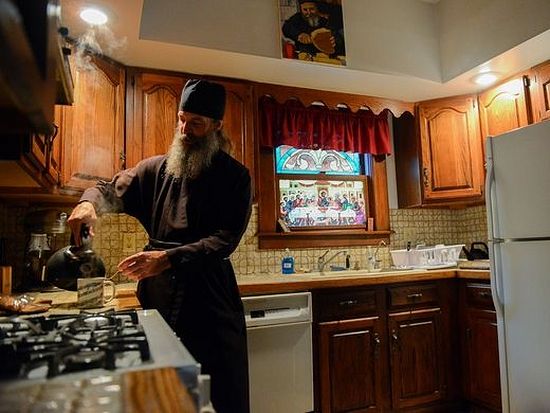 Orthodox monk Roman and his friend Terry Hansen chant during the Vespers prayer service at the St. James Orthodox Church for the Vespers prayer service Thursday, Oct. 13, 2016 in Williamston. Throughout the day Roman leads prayer services both at the church and at the monastery. (Photo: Dave Wasinger/Lansing State Journal)
Orthodox monk Roman and his friend Terry Hansen chant during the Vespers prayer service at the St. James Orthodox Church for the Vespers prayer service Thursday, Oct. 13, 2016 in Williamston. Throughout the day Roman leads prayer services both at the church and at the monastery. (Photo: Dave Wasinger/Lansing State Journal)
The lessons are in tune with the monastery’s patron, St. Romanos the Melodist, the patron saint of musicians in the Orthodox Church.
Those duties are mixed in with the daily chores required of an aging home and small parcel of land. Roman also lends his time and talents to St. James Orthodox Church in Williamston.
It was the church and its priest that drew Roman to Williamston in the first place.
Family roots
Roman, formerly known as Calvin Peters, retired from the U.S. Air Force about four years ago and moved to Williamston from Colorado Springs to help his parents, Richard and Janet Peters.
Richard Peters was the priest at St. James, an Antiochian Orthodox church in downtown Williamston. Roman’s mother, Janet Peters, is an iconographer whose paintings decorate the church and the monastery.
About a year after he moved to Williamston, Roman joined an Orthodox monastery in Detroit, St. Sabbas, and spent his weekends helping with music at his father’s church.
In early 2015, Roman returned again to Williamston to help full-time with the church. He bought the Putnam Street home and continued leading a monastic life of quietude and prayer under the direction of his father.
When his father died in December 2015, Roman was thankful to be located close to home to help his mother.
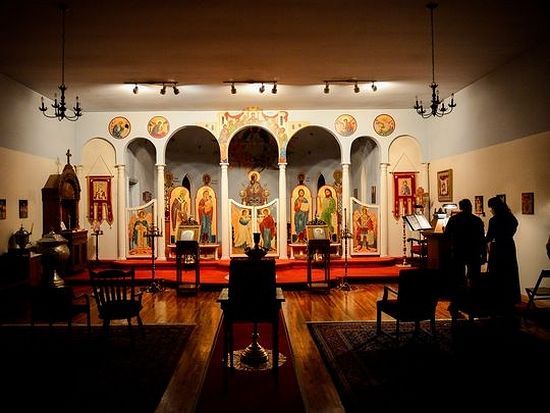 Orthodox monk Roman and his friend Terry Hansen chant during the Vespers prayer service at the St. James Orthodox Church for the Vespers prayer service Thursday, Oct. 13, 2016 in Williamston. Throughout the day Roman leads prayer services both at the church and at the monastery. (Photo: Dave Wasinger/Lansing State Journal)
Orthodox monk Roman and his friend Terry Hansen chant during the Vespers prayer service at the St. James Orthodox Church for the Vespers prayer service Thursday, Oct. 13, 2016 in Williamston. Throughout the day Roman leads prayer services both at the church and at the monastery. (Photo: Dave Wasinger/Lansing State Journal)
Orthodox monk Roman and his friend Terry Hansen chant during the Vespers prayer service at the St. James Orthodox Church for the Vespers prayer service Thursday, Oct. 13, 2016 in Williamston. Throughout the day Roman leads prayer services both at the church and at the monastery. (Photo: Dave Wasinger/Lansing State Journal)
“He had a heart for monastic life for a long time,” Janet Peters said. Like her son, the 80-year-old woman devotes much of her time to St. James Church.
“I’m so lucky,” Roman said. “I love what I do. You know, it’s so peaceful. It’s quiet. It’s slow.”
Roman has asked that the monastery be recognized by his bishop, and is waiting on his blessing. He hopes the Williamston home will one day be recognized as an American Orthodox monastery.
“It’s so unknown in America,” Roman said. “People may have heard of this life of quietude but they don’t get to experience this life in America.”
Occasionally, Roman has visitors: friends from his days in the military or men considering the monastic life. He’s aware that while his existence is quiet, his presence in Williamston doesn’t go unnoticed.
A friend informed him he was a topic of social media posts among area youth who posted photos of “monk sightings” online.
His short walk from St. James Church to the monastery is occasionally interrupted by friendly honks or a wave from a passerby.
His nephew has dubbed him “Monk-le Cal.”
Roman chuckled at the nickname.
"Its remarkably a normal life," he said. "Minus all the noise."
Contact Beth LeBlanc at (517) 377-1167, eleblanc@gannett.com, or on Twitter @LSJBethLeBlanc.

